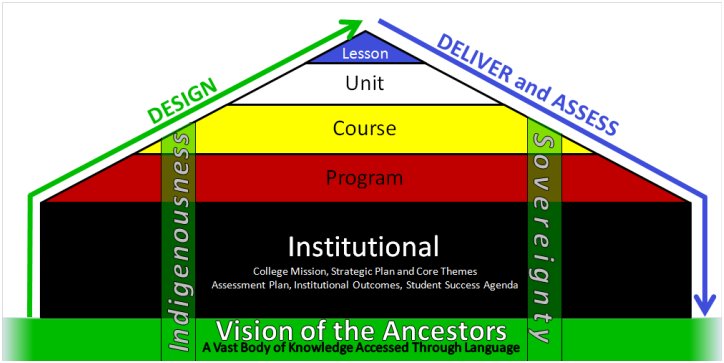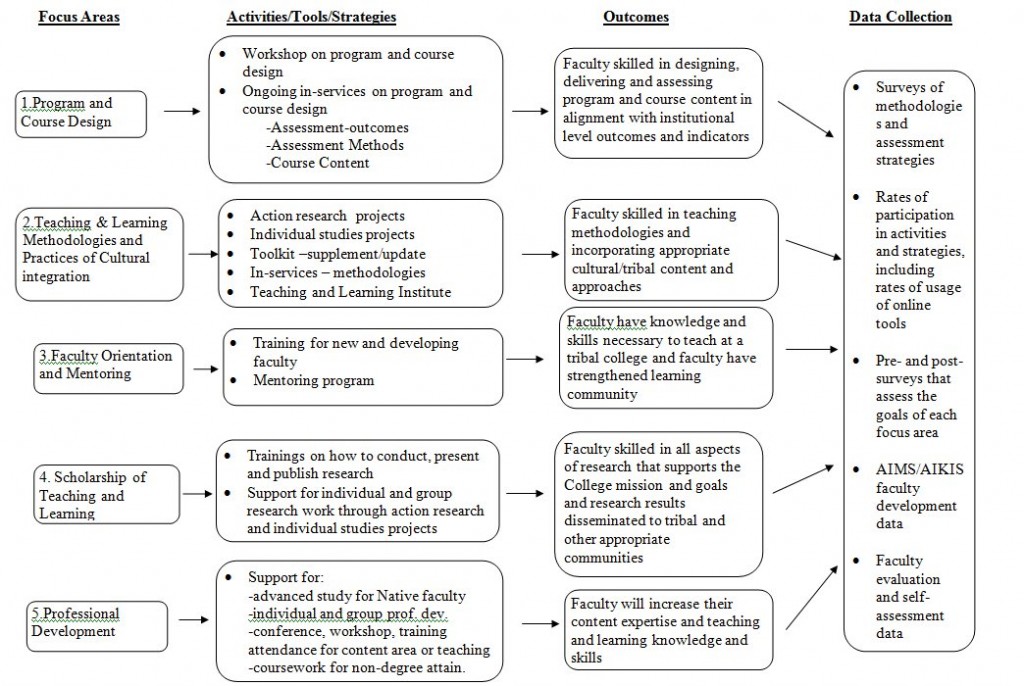Teaching and Learning Plan 2012-2017

(Click here to download a PDF version of the Teaching and Learning Plan)
Introduction
The Teaching and Learning Initiative Plan sustains and builds upon the goals and accomplishments of the Woksape Oyate grant which funded the Teaching and Learning Initiative from 2007 through June 2012. In addition, this plan supports and aligns with the NWIC Assessment Plan (2012-2017), the Achieving the Dream Implementation Plan (2012-2016), the Strategic Plan and Core Themes (2010-2017), and other faculty initiatives, such as faculty inquiry groups (FIGs). The Plan is guided by the foundational principles articulated in the program outcomes for the Bachelor of Arts in Native Studies Leadership.
The overarching goal of the Teaching and Learning Initiative (TLI) is to increase student success by building faculty capacity in teaching and learning at Northwest Indian College. Much of the focus of the TLI is based upon a coherent model for the design, delivery and assessment of educational programs, courses, and course content. In this model, the vision of the ancestors and the vast body of knowledge accessed through language are the foundation for the development, delivery and assessment of the educational programs, courses, and course content at NWIC. The foundational principles of sovereignty and indigenousness inform and guide all aspects of the design, delivery and assessment processes. The following diagram presents the relationship between these levels and the design, delivery and assessment at each level.
Focus Areas in the Teaching and Learning Initiative
The Teaching and Learning Initiative focuses on these five areas:
- Program and Course Design,
- Methodologies of Teaching and Learning and Practices of Cultural Integration,
- Faculty Orientation and Mentoring,
- Scholarship of Teaching and Learning,
- Professional Development – Advanced Study for Native Faculty and other Professional Development.
1. Program and Course Design
The activities and strategies that support the program and course design focus area consist of an initial faculty training workshop with continued faculty support and reinforcement provided by pre-service and in-service program and course design trainings. The workshop material will be developed into an online training that can be used as new faculty and site-based faculty need training. The ongoing trainings will build faculty capacity to implement the design, delivery and assessment model shown above with trainings in how to write curricula, outcome development and assessment, how to link outcomes to methods of delivery, and development of course content. As a result of these trainings faculty will be able to design, deliver and assess at the program, course, and down to the individual lesson and assignment level according to institutional level indicators. The assessment aspects of these trainings and processes will coordinate with the College’s Assessment Plan.
2. Methodologies of Teaching and Learning and Practices of Cultural Integration
The second area focuses on supporting faculty development of the methodologies of teaching and learning and practices of cultural integration, which builds faculty capacity to support and align with the College’s mission and core themes. The activities and strategies used to build faculty capacity in this area include: action research projects; individual studies projects in teaching and learning, which are similar to action research projects but have greater flexibility in their goals and methods; development, updating and use of the teaching toolkit; in-service activities focused on teaching methodologies; and the annual Teaching and Learning Institute. As a result of these activities and strategies, faculty are skilled in using teaching methodologies and incorporating appropriate cultural/tribal content and approaches
3. Faculty Orientation and Mentoring
Area three addresses the need for new and developing faculty to be oriented to teaching at a tribal college. The activities and strategies used include orientation trainings and development of orientation resources plus ongoing mentoring of new and developing faculty by more seasoned faculty. Mentoring will continue for approximately the first 1-3 years that a new full-time faculty is on staff, as determined on a case-by case basis. As a result of these activities and strategies, faculty will increase their knowledge and skills necessary to teach at a tribal college and have strengthened learning community.
4. Scholarship of Teaching and Learning
The fourth area focuses on building faculty capacity in the Scholarship of Teaching and Learning (SoTL). Activities and strategies used include trainings on how to perform research and how to publish results, action research projects, individual studies projects in teaching and learning. This focus area also coordinates with the development and implementation of the Northwest Indian College Press and supporting faculty to prepare and publish scholarly work related to teaching and learning at a tribal college. As a result of the activities and strategies, faculty will be skilled in all aspects of research that supports the College mission and goals and research results will be disseminated to tribal and other appropriate communities.
5. Professional Development – Advanced Study for Native Faculty and other Professional Development
The final area focuses on professional development. It consists of two components: support for Native faculty to pursue advanced study and professional development for all faculty. The support and funding for Native faculty to pursue advances study is overseen by the instructional leadership rather than through the Teaching and Learning Initiative although the data about faculty pursuing advanced study is reported to the TLI for assessment purposes. The second component includes strategies and activities for all faculty to be able to pursue professional development to support their capacity in teaching and learning and to increase their content area knowledge and skills. These activities are not intended for faculty to be pursuing advanced degrees. Activities and strategies include: conference attendance, external training, individual and group professional development which may be pursued as a FIG or content group, non-degree seeking coursework, and other professional development opportunities. Group professional activities may include bringing content trainers to NWIC to raise the capacity of an entire group of faculty. As a result of these activities and strategies, faculty will increase their content expertise and teaching and learning knowledge and skills.
Data Collection and Assessment of the Teaching and Learning Initiative
The data collection and reporting for the TLI consists of indicators that assess multiple focus areas. The data collected will be both for assessing and reporting on the effectiveness of focus areas and also to provide individuals with feedback so that each faculty member can build capacity to teach at Northwest Indian College.
The Data collection and assessment tools consist of:
- Surveys of methodologies and assessment strategies,
- Rates of participation in activities and strategies, including rates of usage of online tools,
- Pre- and post-surveys that assess the goals of each focus area,
- AIMS/AIKIS faculty development data,
- We will also use faculty evaluation and self-assessment data as both a means of assessing individual faculty and to provide them with actionable feedback.


